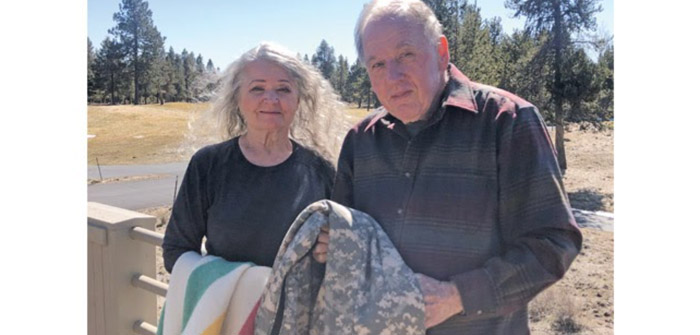(Tina Machuca and Doug Hoschek | Photo by Kristine Thomas)
Sunriver resident Doug Hoschek is determined to create alterations in the textile industry and his community in his quest to protect the environment.
He is on a mission to reintroduce wool to be used in clothing and outdoor gear, bring textile manufacturing jobs back to Oregon and the United States, educate people about the environmental and health hazards of synthetic fabrics and advocate for taking steps to reduce the dangers of wildfires in Sunriver.
“Climate change is running the clock,” Hoschek, 77, said. “We have to reduce the use of plastic in our lives and protect our homes and community from wildfires.”
The owners of Portland Woolen Mills, Hoschek and Tina Machuca are working to reduce the use of plastics by promoting the value of switching from synthetic materials to wool. Hoschek purchased The Portland Woolen Mills in 1981 with the intent on carrying on the company’s history of success. Founded in 1901, The Portland Woolen Mills made wool blankets for the military during World War II. In 1943, the factory won the prestigious Army-Navy “E” Award for its production. By 1950, it had become the largest wool manufacturer in the American West.
The husband-and-wife team have been working from their Sunriver home since 2017 on new wool products including camping blankets, quilts and ponchos. They also have a contract with the U.S. military to make clothing and outdoor gear.
Hoschek and Machuca view their company’s goal to return producing textiles in Oregon and the United States as vital to protecting the environment and creating well-paying jobs. They also understand that how they operate their business plays a role in reducing wildfires.
Their company’s website heightens awareness for The Firewise Communities/USA program, designed to “provide an effective management for preserving wildland living aesthetics…”
A recently retired interpreter for Portland’s Federal Courthouse, Machuca shared her that husband’s passion for their work stems from his past.
A History of Textiles
Hoschek’s commitment and determination begins with his growing up in Long Island, New York. His desire to travel West was inspired by his aunt who was an airline attendant.
“She would show me pictures of all the places she had been, and I wanted to go there,” he said. “I turned down a scholarship to play lacrosse at Penn State to go to the University of Montana.”
There, he said, he fell in love with nature’s immense beauty and enjoyed days exploring the mountains, rivers and lakes.
After graduating in 1965, he returned to New York to begin his more than 50-year career selling, developing and marketing fibers for clothing and outdoor gear. His first job was at a public company called Celanese Corporation, where he was responsible for selling polyester fibers as fiberfill materials to makers of skiwear, outwear, quilted robes, sleeping bags and bedding products. His experiences there led to him being credited as the creator, co-inventor and marketer of Polar Fleece fabric and the Polar Fleece technology.
Once considered a milestone of his success, Hoschek now apologizes for how the synthetic material used in Polar Fleece caused American companies to move their manufacturing to China.
The author of Polar Pollution, Outdoor Memoirs of PolarFleece, Hoschek shares his concerns of how companies claiming to be sustainable leaders are contributing to the water and air pollution in the United States, China and the rest of the world because of the hazards and lifespan of the synthetic material.
Published in 2011, Hoschek wrote in his book, “Currently, we are moving away from sustainability. We should stop doing that.”
He also questions why the outdoor and active sportswear companies located in Oregon aren’t assembling a workforce to manufacture their products here, instead of China and other areas with less environmental regulations.
“I swore off using products containing polyester in 2001, and I have not had a drop since,” he said on a chilly March afternoon. “I have gone back to wool and want others to do the same. I have been spoiled by living in this beautiful nature, and I realized I had to do something to protect it.”
He and Machuca envision having a sewing center in Bend or the Sunriver Business Park for people to earn good wages making their products for Portland Woolen Mills.
Hoschek said he’s been blessed with having the vision and insight to see what’s ahead, while also taking lessons from his past to move forward.
“I have learned it’s possible to have a business that also works to protect the environment,” he said. “I now look at everything I do with my business and my life from an environmental standpoint.”
Establishing a Firewise Community
As Hoschek and Machuca researched ways to protect their home and community from wildfires widely recognized as bi-products of climate change, they developed the core of Portland Woolen Mills. They are both outdoor enthusiasts enjoying golfing, hiking, skiing and biking. Their love and respect for a healthy wilderness is their inspiration to keep their Portland Woolen Mills products plastic free, and their supply chain in the United States.
They are working with community leaders and the Sunriver Fire and Police departments to create a Firewise Communities/USA program which seeks to create a sustainable balance that allows communities to live safely while maintaining an environmental harmony. The Prescribed Forest Living Community encourages homeowners to unite into a community under Firewise, establishing a balance of knowledge while on public lands and promoting environmentally-aware activities.
Machuca shared they are trying to reduce the danger of fires in the Sunriver area by working to educate both residents and visitors.
“We have about 20,000 visitors a day in the summer, and for people who aren’t familiar with the roundabouts, Sunriver can be a confusing place,” she said. “We love living and working in Sunriver, and we are working to help keep it safe for everyone.”
She shared there are steps that can be taken such as removing diseased lodgepole pines, reducing the number of bitterbrush plants and cleaning up pine needles.
They realize they face challenges in their work, but they also know doing nothing and continuing the same path isn’t a choice.
A quote from Chief Seattle summarizes their inspiration. It reads, “We are webbed in blood to the land; whatever we do to the land, we do to ourselves.”






